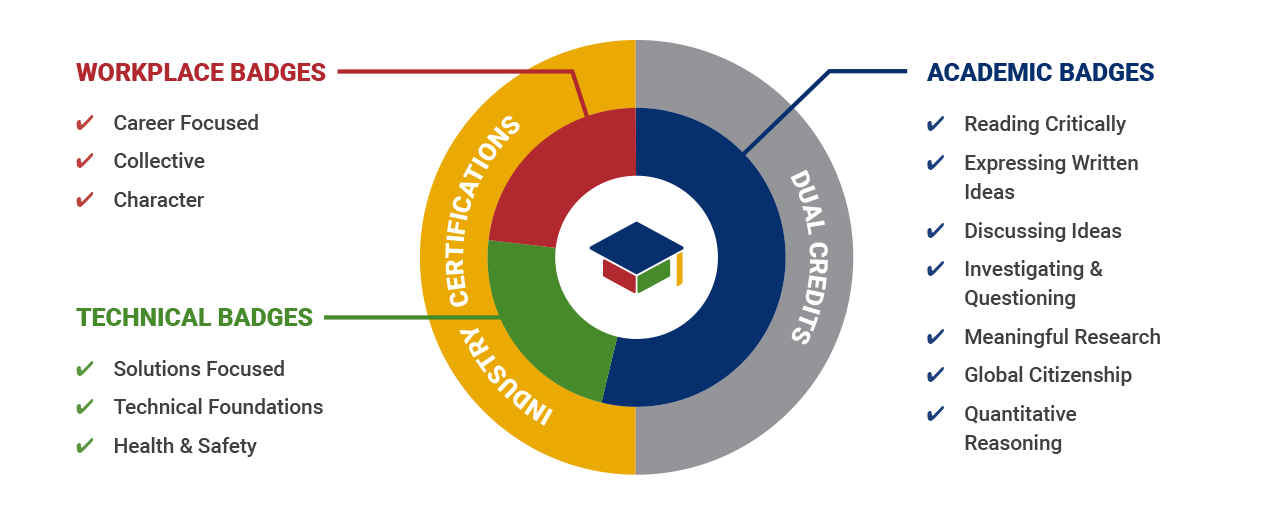The jobs of tomorrow are not yet defined. Therefore, it is more important than ever to go beyond STEM education; for students to have a foundational knowledge of Industry 4.0 and the Internet of Things. By incorporating industry identified foundational skills, KTEC has developed interdisciplinary, project-based learning that will allow students to earn competency focused on Industry 4.0. A singular career pathway will not allow students to build the interconnected, transferable skills necessary for high skilled careers. By having foundational knowledge and industry awareness gained in their first two years, KTEC students will be uniquely prepared to move beyond isolated knowledge of one industry sector and broaden their employability.
C3 Principles
Character Development
Self Awareness:
FOCUS ON:
Creativity
Emotional Intelligence
Active Learning
Habit Building
Resiliency/Perseverance
Integrity
Judgment/Decision Making
Career Focused
Career Awareness & Interest:
FOCUS ON:
Proficiency in Academic Skills
Earned Technical Competencies
Financial Literacy
Originality
Contribution to Employers
Professionalism
Learning Strategies
Collective Work
SOCIAL Awareness:
FOCUS ON:
Teamwork
Interpersonal Communication
Respect for Others/Trust
Fluency of Ideas
Cognitive Flexibility
Leadership Skills
Negotiation
Portrait of a KTEC High School Graduate

Badges
Badges are composed of multidisciplinary skills called competencies that are necessary for future success. Competencies will results in earning badges required for graduation.
Core Competencies/Competencies
Core competencies are composed of a specific group of skills on which students will be assessed. Each semester, students will partake in seminars where they will have the opportunity to choose which competencies they will work towards. Throughout their four years of high school, students will collect evidence that will be used in a portfolio to demonstrate proficiency in core competencies.
Content Seminar
Seminar courses are approximately 40 days of instruction around one or more specific content areas. Students will use teacher developed experiences to produce evidence that can be used to demonstrate proficiency in competencies.
Credits
In order to receive course credit in a seminar, students must complete and turn in all tasks and evidence. Each seminar course will earn 0.25 credits. Students will complete a combination of seminars in content areas to meet the credit requirements.
Dual Credits
Students will have the opportunity to achieve dual credits with Gateway Technical College through a variety of ways: transcripted credit, advanced standing, start college now, distance learning, youth apprenticeship, contract for service, and high school academies. KTEC HS utilizes these options as a way for students to gain high school and college credit simultaneously as both KTEC HS and Gateway students. Therefore, KTEC HS will follow Gateway’s grading policies and student handbook for these courses. To receive both Gateway and KTEC HS credit, a student must meet Gateway’s course grading policy, which requires a C or higher to receive credit. Students who do not meet a C or higher will not receive high school or college credit.
Graduation Requirements
Students need to meet 100% of their badges to graduate.
- Students will need to meet a specific percentage of their competencies in each badged area. (80% needs to be met in Academic badges and 100% met in Technical and Workplace badges)
Students will need to gain 26 credits. Below outlines suggested credits to ensure students have the required content seat time to be college ready.
Seminar Grading
Summative
These are cumulative assessment measures that students align to competencies. These could be research papers, projects, or an authentic learning experience. Students will work with their seminar teacher and C3 advisor to align competencies to work in the classroom. Students will be assessed by using the project and/or assignments as evidence of their learning. Teachers will assess using a rubric for each aligned competency. Proficiency will be met when the student achieves a 3 or higher on a competency.
Formative
These are moment in time learning experiences that allow student the opportunity for feedback on the content as they are developing summative projects. These are not graded, but rather students are given feedback from the teacher to improve performance.

